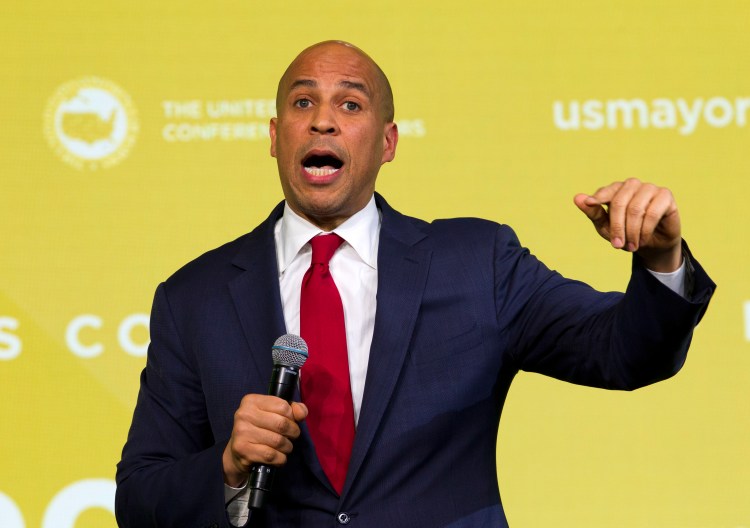Sen. Cory Booker of New Jersey said Friday that he will seek the Democratic nomination for president, adding his name to a growing and increasingly diversified field of 2020 candidates intent on taking on President Trump.
Booker made his announcement via an email and video to supporters, and he had interviews scheduled throughout the day.
“The history of our nation is defined by collective action; by interwoven destinies of slaves and abolitionists; of those born here and those who chose America as home; of those who took up arms to defend our country, and those who linked arms to challenge and change it,” Booker said in his video, which made repeated references to Trump and his actions as president.
“I believe that we can build a country where no one is forgotten, no one is left behind; where parents can put food on the table; where there are good paying jobs with good benefits in every neighborhood; where our criminal justice system keeps us safe, instead of shuffling more children into cages and coffins; where we see the faces of our leaders on television and feel pride, not shame,” he said.
Booker joined a race already occupied by three other senators — Kamala D. Harris of California, Elizabeth Warren of Massachusetts and Kirsten Gillibrand of New York — as well as several other candidates.
His decision did not come as a surprise. Booker has been traveling to early-voting states for months, teasing his eventual entrance. On the Martin Luther King Jr. holiday last month, he visited South Carolina, the first of the early-voting states in which black voters dominate.
That same day, Harris announced that she was running for president. Booker’s entry makes this the first nomination contest with at least two major African American contenders. Former Attorney General Eric H. Holder Jr. is also considering a run.
Booker’s announcement came toward the close of a week that raised the prospect of a significantly more complicated 2020 campaign. Former Starbucks CEO Howard Schultz confirmed on CBS’s “60 Minutes” that he was considering an independent run for the presidency.
While Schultz, a billionaire, argued that both major political parties were broken — and he plans to spend lavishly to make his point — Booker implicitly defended the Democratic Party and its policy priorities.
Booker, 49, has been looked at as a potential presidential contender for most of his political life. In 2002, when he made his first, unsuccessful bid for mayor of Newark, he was followed by reporters and documentary crews; a chronicle of the campaign, “Street Fight,” was nominated for an Academy Award. Four years later, Booker ran again and won by a landslide.
From City Hall, Booker became one of the country’s best-known mayors, leveraging his fame into attention and lucrative investments for Newark. Months after taking office, the book-on-tape start-up Audible moved its headquarters to Newark. Months after Booker won a second term, Facebook founder Mark Zuckerberg plowed $100 million into a fund to improve the city’s schools.
The mayor found plenty of critics, who argued that his effervescent Twitter presence and willingness to visit constituents at their homes masked persistent problems with public services. In 2012, Booker angered liberals by criticizing President Barack Obama’s attacks on Republican presidential nominee Mitt Romney, saying that painting Wall Street with “broad brushes” was unfair to “the good people who work there.”
But in 2013, when the death of Frank Lautenberg opened one of New Jersey’s U.S. Senate seats, Booker zoomed through a special election and won easily — with a donor list that included Ivanka Trump. Booker was the first black Democrat to join the chamber since Obama had left it, and quickly established himself as a business-friendly liberal.
After winning a full term in 2014, Booker began to make moves on the left. He broke with Sen. Robert Menendez (D-N.J.) to back Obama’s nuclear deal with Iran, and helped protect states that had legalized medical marijuana. In 2016, Sen. Bernie Sanders (I-Vt.) quietly vetted Booker as a potential running mate. In 2017, Booker endorsed Sanders’s Medicare-for-all heath-care plan, as well as legislation to raise the minimum wage to $15 an hour.
Despite that, Booker has been viewed skeptically by his party’s left, and been ridiculed by conservatives who say his image has been carefully manufactured.
Booker is the rare bachelor to seek the presidency; none has been elected since 1856. He told the Philadelphia Inquirer that he is straight.
In his announcement video, Booker talked of his upbringing in New Jersey, one that he noted distinguishes him from the rest of the Senate — as well as his competitors in the presidential race.
“When I was a baby, my parents tried to move us into a neighborhood with great public schools, but Realtors wouldn’t sell us a home because of the color of our skin,” he said. “A group of white lawyers, who had watched the courage of civil rights activists, were inspired to help black families in their own community, including mine. And they changed the course of my entire life. Because in America, courage is contagious.
“My Dad told me, ‘Boy, never forget where you came from, or how many people had to sacrifice to get you where you are.’ ”
Send questions/comments to the editors.



Comments are no longer available on this story